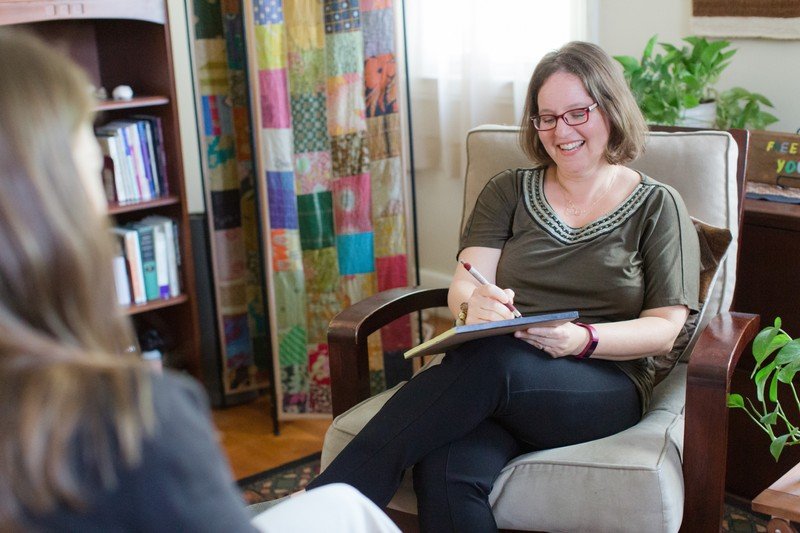‘How will I know it’s working?’ and other common questions about therapy
Going to therapy can seem like a mysterious process. The only references many of us have are from movies like Good Will Hunting and TV shows like Mad Men. These representations are not only inaccurate, but they also leave us with understandable questions about what therapy is actually like.
Here are some frequently asked questions about therapy and answers to help you better understand what you’re getting into:
How do I know I need therapy?
Most depictions in movies and TV shows make it seem like only people with serious mental health issues seek therapy. But everyone feels stuck at times in a relationship, at work, or in some other part of their life.
Maybe you’ve been having trouble sleeping or sleeping more than you’d like. Maybe you’re struggling through a painful breakup or navigating dating apps for the first time. Maybe you’re stressed about work or want to make a career change. Maybe you’re feeling isolated and lonely or overwhelmed by family responsibilities. Maybe you’re trying to stop a harmful habit or start a healthy routine. Maybe you’re going through a difficult time or looking to deepen your self-awareness or spiritual practice.
There are many reasons to seek out help from a therapist, from navigating mental health issues to changing patterns and behaviors that get in the way of the life that you want. You can always try it out and walk away if it doesn’t feel like it’s helping. Your therapist won’t force you to keep showing up—it’s ultimately up to you to decide how long to go.
Why do I need therapy? I can handle my own problems.
Therapy is handling your own problems. You’re taking responsibility for the reality of your life and committing to making changes for the better. You’re willing to ask for help because each and every one of us needs support in challenging times.
It actually takes strength to ask for help—because asking for help means being vulnerable, which is a scary thing to do. Vulnerability, the social worker and researcher Brené Brown writes, is “having the courage to show up and be seen when we have no control over the outcome.”
Your therapist’s primary goal will be to give you the chance to be vulnerable, to process your thoughts and emotions in a safe space without judgment. This can feel uncomfortable, but it’s not all doom and gloom. Brown continues: "Vulnerability is the core of shame and fear, but it is also the birthplace of joy, happiness, creativity, belonging and love."
It’s so much easier to stick to our way of doing things, try to forget about our feelings, and stay in our comfort zone. But that’s why we stay stuck feeling the way we do, or why we’re not making any progress on those big changes we want to make, or things aren’t getting any better at work or home.
You may have overcome these issues in the past by changing your lifestyle, reading books, or talking with friends and family. But therapists are professionally trained to point out the things you aren’t seeing, teach you new skills, and help you prepare for the next challenge that life throws your way.
What is a therapy session actually like?
This is a great question because, again, pretty much everything in movies is inaccurate. Your therapist will sit across from you (or on video chat) and guide the conversation for around 50 minutes or an hour. They’ll ask questions, like, “How have you been feeling lately?” They’ll listen and really try to understand what you’re going through. They’ll ask other questions that sound strange but will help you better understand how you’re feeling, like, “What do you notice in your body right now?” They’ll offer skills you can use during and after the session for managing stress, increasing resilience, improving communication—whatever your goals are.
Your therapist will be friendly, but they’ll be different from your friends, partner, or family. This is because—again—their goal is to give you the chance to process your thoughts and emotions in a safe space without judgment. They can do this because they have no agenda. They won’t try to change how you feel or make you like them.
The first few sessions might be a little different than the typical session, as your therapist gets to know you and what you’re going through. They’ll ask you to share about your home life, relationship, work, childhood—though you’ll always control what you’re ready and willing to talk about.
Just like in any relationship, eventually the two of you will settle into a way of being with each other that feels productive and comfortable. Or you won’t—and that’s okay too. Your therapist can easily refer you to another therapist who might be a better fit.
Will I be judged?
No. Period. Therapists are trained in caring for clients but also allowing them to be their own person, with permission to have their own feelings and experiences. They encourage you to share as honestly as you can about work, your relationship, your family, wherever you’re feeling stuck. Their aim is to help you figure out why things are stuck and how to move forward, not to judge or change you.
Again, this doesn’t mean that your therapist is like a friend. Their job isn’t to let you vent, validate your feelings, and give you advice. Once they sense that you feel safe, they may encourage you to explore uncomfortable thoughts and feelings. They might push you to look at situations, relationships, and emotions you’ve been avoiding—all while accepting and caring for you just as you are.
How will I know it’s working?
Therapy is a journey—you don’t always see results overnight. While you’ll likely feel some relief within a few sessions, long-lasting progress may take weeks, months, or even years. This is because therapy not only treats symptoms, but it also addresses root causes. If your goal is to lower your anxiety, your therapist will not only help you learn new ways to cope with it, but they’ll also help you explore why it’s happening in the first place.
When you first start therapy, your therapist may work with you to develop goals. Some example goals include lowering anxiety, improving communication in your relationship, becoming a better parent, finding your calling, navigating a career change, or processing the loss of a loved one. As therapy progresses, your therapist will check in to adjust what they’re doing or change the goals themselves—always in collaboration with you.
How often should I go and for how long?
As the client, you always control the frequency and number of sessions. Typically, your therapist will recommend meeting weekly, especially in the beginning. This is because it takes commitment and consistency to build trust and rapport. But it’s ultimately your call. If you want to move to bi-weekly after a few months, that’s up to you.
For how long you see your therapist is up to you as well. Your therapist might recommend continuing or ending therapy based on your progress and goals. But you decide when you don’t need more sessions. Some people go to therapy for a few months as they navigate a difficult situation while others see their therapist as a helpful guide for many years. Together, you and your therapist will talk about what is most supportive to your ongoing growth and well-being.
Still on the fence? Here’s more on the different ways that therapy can help you.
If you’re interested in booking a session with a Four Corners Counseling & Well-Being therapist, call 301.960.8960 to speak with our Client Care Coordinator or use our contact form to get in touch.


